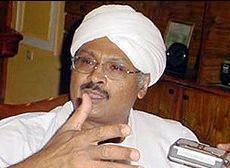Sudan president sacks aide, ministers may quit
By Opheera McDoom
KHARTOUM, Oct 7 (Reuters) – Sudanese President Omar Hassan al-Bashir has sacked one of his top aides, a move that may lead to a number of ministers from the aide’s group quitting in protest, presidential sources and analysts said on Thursday.
 Bashir said in a decree issued on Wednesday he was relieving Mubarak al-Fadil al-Mahdi [photo] from his post, but gave no reason.
Bashir said in a decree issued on Wednesday he was relieving Mubarak al-Fadil al-Mahdi [photo] from his post, but gave no reason.
Mahdi heads a group that broke away from an opposition party and then joined the government about two years ago.
Mahdi’s group, which holds about nine ministerial and other senior posts, met to discuss whether to split from the government in protest, but decided to reconvene the following day without making a definite decision.
“Definitely there was a consensus in comdemning the decision. It was a decision that has insulted the party and that the party is wholly behind its leadership,” Mahdi told Reuters after the meeting.
He added many of the ministers had told the party they would resign, but no final decision had been taken yet.
He said there had been an approach by the ruling National Congress Party, which dominates government and parliament, to reconcile the party and they would discuss that initiative on Friday.
The government, which says it has uncovered three attempts to destabilise it in the past six months, is weakened, according to analysts. It is also divided about how to respond to international pressure to stop a conflict in the Darfur region.
The United States has branded the violence in the western region genocide and the United Nations has threatened possible sanctions if the government does not end the violence.
The situation in Darfur could also hamper peace talks which restarted on Thursday to end the long civil war in south Sudan.
Sudanese Foreign Minister Mustafa Osman Ismail said on Thursday Bashir’s decree was issued by the president’s executive office because of “differences of opinion” and would not affect Mahdi’s party’s relations with the government.
Mahdi’s party split with former Prime Minister Sadiq al-Mahdi’s opposition Umma party about two years ago and now holds ministerial posts like the information and international cooperation portfolios.
Mubarak al-Fadil al-Mahdi is a cousin to Sadiq al-Mahdi, the last elected leader of Sudan.
DIFFERENCES OVER REBELS
One source close to the government said Mahdi had been at odds with the powerful First Vice-President Ali Osman Mohamed Taha over meetings with a southern rebel group, the Sudan People’s Liberation Army (SPLA). The SPLA resumed talks with the government on Thursday in Kenya to finalise a peace deal.
“Mahdi said the dealings (with the SPLA) were in his capacity as head of the Umma breakaway party, but I guess they finally got fed up with him,” the source said, adding that Taha was keen to ensure the government was united in its contacts.
“I’d be surprised if the party doesn’t decide to walk out … which will be a blow,” said the source. “It will be very ugly and send a very negative message to the SPLA and the (opposition parties) in Cairo.”
The government is due to hold talks in Cairo hoping to woo back opposition parties.
Mahdi told Reuters the decision came from differences with Taha and a small group’s hegemony over decision-making, especially in issues like Darfur and the southern peace process.
“The differences are about the methodology about decision-making within the government which has led to such problems now in Darfur,” he said. “We need to have a collective decision-making process in order to be able to face the challenges facing the nation.”
Professor of political science at Khartoum University Raphael Koba Badal said the move to sack Mahdi could be a sign the government was trying to woo back the mainstream Umma party, which is the most powerful opposition party.
“There is a possibility of reconciliation now,” he said. “They are the major party in Sudan.”
Sadiq al-Mahdi was overthrown by the bloodless coup which brought Bashir to power in 1989.
